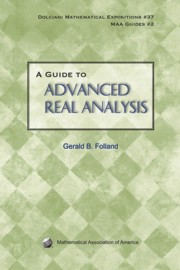Book contents
- Frontmatter
- Preface
- Contents
- Prologue: Notation, Terminology, and Set Theory
- 1 Topology
- 2 Measure and Integration: General Theory
- 3 Measure and Integration: Constructions and Special Examples
- 4 Rudiments of Functional Analysis
- 5 Function Spaces
- 6 Topics in Analysis on Euclidean Space
- Bibliography
- Index
- About the Author
Preface
- Frontmatter
- Preface
- Contents
- Prologue: Notation, Terminology, and Set Theory
- 1 Topology
- 2 Measure and Integration: General Theory
- 3 Measure and Integration: Constructions and Special Examples
- 4 Rudiments of Functional Analysis
- 5 Function Spaces
- 6 Topics in Analysis on Euclidean Space
- Bibliography
- Index
- About the Author
Summary
The term “real analysis” refers, in the first place, to the classical theory of functions of one and several real variables: limits and continuity, differentiation, the Riemann integral, infinite series, and related topics. However, it has come to encompass some theories of a more abstract nature that have extended the ideas of real-variable theory to much more general settings, a development which in turn has shed new light on concrete, “classical” problems. This more advanced part of real analysis is the subject of the present book.
This book is addressed, therefore, to people who are already familiar with classical real-variable theory. (Many books are available on that subject; the old classic is Rudin [16], and the most engaging of the recent ones is Körner [10]. In addition, an MAA Guide to it by Steven Krantz [11] is appearing along with this one.) In accordance with the philosophy of the MAA Guides, my aim is to give an account of the subject within a brief text that will provide an overview for the novice and a refresher for those who have already studied it. Essential definitions,major theorems, and key ideas of proofs are included; technical details are not. Thus, most of the formally stated results in the book are followed by sketches of proofs whose degree of completeness varies widely. The results for which little or no proof is provided fall into two categories, which are distinguished by the labels “Proposition” and “Theorem.”
- Type
- Chapter
- Information
- A Guide to Advanced Real Analysis , pp. vii - viiiPublisher: Mathematical Association of AmericaPrint publication year: 2009



